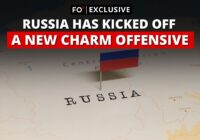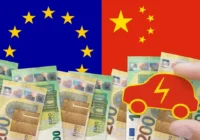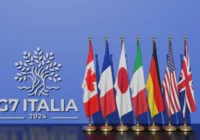Five months after the 9/11 attacks, US President George W. Bush asserted his acrid perception of the enemies of the United States by introducing the notion of an “Axis of Evil” comprising the tripartite entity of Iran, Iraq, and North Korea. Ironically, none of the criminals involved in the terrorist attacks trailed back to any of these three nationalities. However, that anecdotal coinage was enough to serve as a pretext for the ultimate invasion of Iraq in 2003.
Now, two decades later, that phrase has been conveniently reforged by a Russian parliamentarian, touting the “Axis of Good” Russia is shaping through a convergence with Iran and China in their shared anti-American rhetoric. While calling it ‘good’ is a long stretch given the backdrop of the raging war waged by Russian President Vladimir Putin, the underlying tenets should not be dismissed even as they are shrugged off by the western coalition. And while the Cold War 2.0 is still a distant possibility, the birth of this new world order is visible though not entirely material.
Putin’s first international visit since the invasion, beyond the borders of the former Soviet Union, was to Iran. The official rationale was a tripartite discussion of Syrian policy with Iran and Turkey. But no one should be so naive as to accept that description at face value. The trilateral meeting was a strategic statement; a formulation of options, for all three countries involved.
The Strategic Genius of Turkey
Turkey is portraying its political artistry in the region. It is playing the Western alliance through its veto power over the NATO membership of Finland and Sweden. Simultaneously, Erdoğan is flirting with Russian favors by mediating negotiations with Ukraine and concerting on crucial regional issues (like Syria) with Putin despite his brutal alienation of the West. While supplying arms to the Ukrainian front, Turkey has also refused to comply with Western sanctions against Russia and is even planning to trade oil in rubles. Consequently, these contradictory policies have rapidly positioned Erdoğan as a strategic champion, indispensable to both the United States and Russia. And admittedly, this strategic game plan works wonders and could yield another electoral win for Erdoğan in the 2023 General Elections, despite his disastrous mismanagement of the Turkish economy.
The Russo-Iran Polarity with the Western Order
It is obvious why Putin wants to highlight his political brinkmanship by establishing a unique alliance with Iran. It is his way of saying the Kremlin is fully prepared for a reshuffle in power dynamics of the region, spurred by the invasion of Ukraine which was itself catalyzed by the eastward expansion of NATO. Putin’s renewed affection for Iran could also be construed as a response to Biden’s dismally unproductive visit to the Middle East and his failed attempt to woo the Saudi Kingdom. However, Iran is a staunch enemy of Israel, a sentiment not shared by Russia, which limits the scope of this peculiar alliance. Nonetheless, Israel is not nearly as pivotal to the long-term eventually hegemonic goals of Putin as Iran, especially when the pretext for collusion is a shared hatred for American supremacy.
For Iran, the motivation is easier to unravel. The nuclear deal is still in limbo. The Iranian position has visibly hardened after the ill-timed discourse between Biden and Israeli Prime Minister Yair Lapid. Biden’s frivolous remarks regarding Iran did not help the Western view of containment. Biden’s call for action to “stop Iran from getting nuclear weapons by any means, including force, as a last resort” in his attempt to muster a Gulf alliance against Iran was particularly awkward, given with the negotiations of an essential deal still hanging by a thread.
Budding Leverage in Respective Regions
Contrary to Biden’s hapless efforts, the Gulf states – including the UAE and Saudi Arabia – are mulling the idea of rewiring their frayed diplomatic relations with Iran. In a recent interview, Anwar Gangash, the diplomatic adviser to President Sheikh Mohammed bin Zayed al-Nahyan, stated that “the conversation is ongoing,” and the UAE is “in the process of sending an ambassador to Tehran. All these areas of rebuilding bridges are ongoing.” Even the Crown Prince of Saudi Arabia Muhammad Bin Salman (MBS) voiced his aspirations in an interview with The Atlantic earlier in March, stating: “[Iran and Saudi Arabia] are neighbors. Neighbors forever. We cannot get rid of them, and they can’t get rid of us. So it’s better for both of us to work it out and to look for ways in which we can coexist.”
The trajectory of the Middle East is seemingly tilting toward regional concord, beyond the lines of sectarian and ideological differences consistently exploited by successive American regimes in the past. And thus, Iran’s collusion with Russia (and the Gulf states) could lead the Islamic Republic away from its hardcore resentment for Israel. At least in the short term. But it would also integrate Iran into a parallel bloc no longer submitted to American restrictions, whether it be the form of human rights policing, economic sanctions, or international isolation.
In a high-profile meeting with Putin, Iran’s Supreme Leader Ayatollah Ali Khamenei unequivocally voiced his support for the Russian invasion, stating: “War is a violent and difficult issue, and the Islamic Republic is in no way happy that civilians get caught up in it, but concerning Ukraine, had you not taken the initiative, the other side [NATO] would have taken the initiative and caused the war.”
Such an explicit assertion is not dependent on any detailed analysis or interpretation. Iran is unambiguously throwing its weight behind Putin to advance the Russian claims against the US. And the excuse of a palpable competition in the market for sanctioned oil is simply wishful thinking, a product of Western think tanks. Despite sanctions, Russia has already surpassed its budgetary revenue estimates from fossil fuel imports. And according to Elvira Nabiullina – the Governor of the Russian Central Bank – Russia would categorically refuse to sell oil to countries attempting to place a price cap on Russian energy supplies.
The gas supplies through the Nord Stream 1 (NS1) pipeline have already been squeezed down to 20% of capacity. Thus, demand would not be an issue when Europe freezes next winter. That is bad news for Joe Biden. And while a recession could undercut the abnormal prices of commodities and fuel, inadvertently financing Russia’s war in Ukraine, it would also debilitate Europe’s ability to wean itself from Russian energy. This is especially true of Germany, the bedrock of the European economy and its manufacturing hub. Hence, Iran, a member of the OPEC+ alliance alongside Russia, would gain significant leverage in the broader market when the Western defiance loses its luster in the face of domestic economic misery.
The Geopolitical Vision of China
The simmering tensions in the Taiwan Strait may initially seem little more than an over-aggressive response to Ms. Nancy Pelosi’s recent visit to Taipei. However, the underlying factors are much more about a power statement made by Washington and now reciprocated by the Chinese Communist Party. Vying for another term to consolidate his legacy, President Xi Jinping is surely not looking to project a docile image, especially when Russia is braving an allied Western front on its periphery.
However, China, contrary to Iran, has been particularly distant from the chaos in Europe, tip-toeing the fine line between condoning and censuring the Russian invasion of Ukraine. Yet, by no means can we deem China neutral. Even India, a bellwether American ally, is not a neutral player as it continues to profiteer off discounted Russian oil despite Western reservations. China has remained critical of the US response against Russia, terming the sanctions illegal and immoral. China continues to fill Russian coffers by procuring sanctioned oil despite its ongoing economic slowdown.
While I admit it is unrealistic to assume that Beijing would outright support the anti-Western rhetoric reflected by Moscow or Tehran, it would presumably back any alliance that shapes a parallel hegemon to the transatlantic order. Cues abound to back up this assumption, such as Xi’s welcoming Putin at the Winter Olympics mere days before the invasion of Ukraine, or convening the BRICS Summit at the very moment Russia was wreaking havoc. Hypothetically, nurturing an alternate order would not only allow Beijing to set in place a new cornerstone in Middle Eastern and European politics, it would also ensure both diversified energy supplies for its industries and new investment avenues in the region. This would make it harder to isolate China (economically or diplomatically) in the event of an invasion of Taiwan. Ultimately, I believe that China, though not yet open to complete defiance of the Western world order, would still support a fledgling rivalry on the global diplomatic canvas, reinforced by the regional sway of Iran and Russia.
The blend of economic and diplomatic adjustment has been a marvel of the Chinese regime. While the Western alliance has noticeably shifted gears to cultivate allegiances in the Asian-Pacific peninsula, China has maneuvered to push the US to a second-tier position across the Horn of Africa. From Ethiopia to Zambia, Beijing has cultivated loyalty through debt-relief and conflict mediation strategies gauged towards famine-stricken nations dominated by authoritarian regimes.
Leveraging the Communist Party’s innate understanding of their leadership model, Xi Jinping has masterfully perpetuated his One-Party ideology in Africa to supersede the traditional American meme of democracy. However, contrary to the Indo-Pacific Economic Framework (IPEF) – a ruse to cajole the Indo-Pacific nations into an anti-Chinese economic model with apparently no free-trade access to the American market – China is courting African loyalties with relative empathy. The trade between China and the African continent surpassed $250 billion in 2021. Compare that to less than $65 billion for the United States. And while massively debt-ridden, nations like Zambia are still active investment pools for Chinese businesses without the harsh perquisites and crippling conditions imposed by the Western multilateral institutions offering bailout packages. Ultimately, the Chinese model of diplomacy and economic integration, despite an alleged legacy of chronic debt-traps evoked by the West, comes with a no-strings-attached offer. At the same time, the US – and its European allies – remain focused on the idea of acute economic discipline and regulatory restrictions that complement and condition the flow of funds. This idea is rapidly turning unpopular and leading to an Asian/African shift of preference towards China.
Headway Toward a Multipolar Reality
Over the last few decades, the US has tirelessly pursued a policy of pressure and surrender. This is how it has played out in Vietnam, Afghanistan, Iraq, or Syria and elsewhere! The US has sketched out a diplomatic code that suits the pseudo-liberal definition of its goals and the means required in any region. And it has used this subjective code to rally neighboring nations in various parts of the globe against regimes it manages to isolate to achieve dominance. Biden has not deviated from this traditional course of American foreign policy. On the other hand, he has been relatively less bombastic about it than his Republican predecessors.
The world, however, has evolved beyond the unipolar political template established in the post-Cold War era. Today the world is intricately globalized and perilously interdependent. The US cannot undercut the economic rise of China without inflicting severe damage to its own productivity. European economies – like those of Germany and Hungary – cannot shed their dependence on Russian energy without facing a significant economic slowdown and a painful recession. And the Middle East cannot stabilize by normalizing relations with Israel while simultaneously isolating a belligerent Iran in its periphery.
Ultimately, I believe the constituents of this new world order are indispensable, even if the Western coalition continues to act as the guarantor of a rules-based order. And hence, the potency (or villainy) of this newly synergized axis, its success or failure, would largely depend on the conciliatory (or retaliatory) role played by the United States in this recalibrated global political structure.
The views expressed in this article are the author’s own and do not necessarily reflect Fair Observer’s editorial policy.
Support Fair Observer
We rely on your support for our independence, diversity and quality.
For more than 10 years, Fair Observer has been free, fair and independent. No billionaire owns us, no advertisers control us. We are a reader-supported nonprofit. Unlike many other publications, we keep our content free for readers regardless of where they live or whether they can afford to pay. We have no paywalls and no ads.
In the post-truth era of fake news, echo chambers and filter bubbles, we publish a plurality of perspectives from around the world. Anyone can publish with us, but everyone goes through a rigorous editorial process. So, you get fact-checked, well-reasoned content instead of noise.
We publish 2,500+ voices from 90+ countries. We also conduct education and training programs
on subjects ranging from digital media and journalism to writing and critical thinking. This
doesn’t come cheap. Servers, editors, trainers and web developers cost
money.
Please consider supporting us on a regular basis as a recurring donor or a
sustaining member.
Will you support FO’s journalism?
We rely on your support for our independence, diversity and quality.







Comment